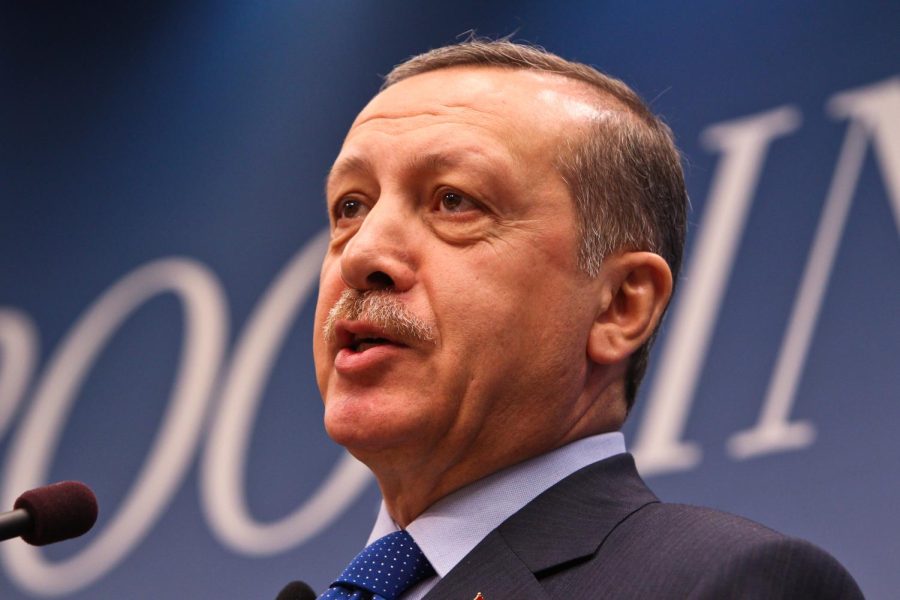Opinion | NATO expansion harms Kurds
Photo courtesy of Paul Morigi Photography/Brookings Institution/Flickr
H.E. Recep Tayvip Erdogan speaks about his twelve years in office and the Turkish role in the international community on May 17, 2013. Senior columnist Eddie Ryan argues that expanding NATO can hurt the world’s largest ethnic group, the Kurds.
September 2, 2022
After six months of fighting, Russia’s war against Ukraine rages on. It takes depressingly little time for large scale aggressions like this one to recede into the back of the public’s mind. Nevertheless, though the war has settled into a stalemate phase, this summer brought important developments.
Russia now controls about one-fifth of Ukraine’s territory, but is struggling to advance in the key eastern province of Donetsk. Ukraine is taking increasingly daring shots at Russia and looking to counterstrike in the south using U.S.-supplied High Mobility Artillery Rocket Systems.
Perhaps most nerve-racking is the shelling around the Zaporizhzhia Nuclear Power Station. The plant, Europe’s largest, is currently held by Russian troops playing a bit too fast and loose with the risk of nuclear catastrophe. That’s not to mention more murder of Ukrainian civilians and the revolting injustice done to Brittney Griner in July.
This war has also touched a certain group especially accustomed to playing the pawn in international affairs: the Kurds.
Fearing the same fate which befell Ukraine, Finland and Sweden applied for NATO membership in May. Only Turkey opposed their accession, leading to talks that eventually produced the Trilateral Memorandum, an agreement among the three nations which allows Finland and Sweden to advance toward full member status. The memorandum’s focus? Fighting terrorism, as defined by Turkey.
Get The Daily Illini in your inbox!
Some history is needed here. The Kurds are the world’s largest ethnic group without a state, concentrated mainly in Syria, Turkey and northern Iraq. Turkish leaders like current president Recep Tayyip Erdogan have long opposed Kurdish demands for statehood.
Erdogan himself uses the word “terrorism” quite liberally when describing all things Kurdish, a hallmark of authoritarian repression of oppressed peoples.
That’s what makes Finland and Sweden’s commitment to deport Turkish terror suspects and join Turkey in the “fight against terrorism” very concerning for Kurds living in these two countries.
It’s true that the memorandum mentions specific militant groups like the PKK, or Kurdistan Workers Party. While the PKK certainly fights for Kurdish self determination, they are not its most savory representative. Even to some of the most loyal allies of the Kurdish cause, the group is sometimes viewed as “a Stalinist cult organization…[and a] thuggish faction.” The PKK thus bears a resemblance to Hamas for its extremist approach to a worthy, noble cause.
Some might therefore argue that agreeing to squeeze the PKK, a group engaged in a decades-long violent conflict with Turkey and designated by the U.S. State Department as a terrorist organization, is a small price to pay for strengthening NATO. This is wrong on principle and dangerous in practice.
Even if the agreement concerned only the PKK, it would amount to Turkey bullying foreign governments and stalling the proceedings of an international alliance for its own unrelated nationalist priorities. Or, if you like, standard diplomacy.
In reality, the agreement is much more open-ended. Turkey decides who is a “terror suspect” deserving of extradition, and what count as “threats to its national security.” When this is the case, Kurds are right to feel unsafe.
This ambiguity is enough to create concerns that Turkey’s campaign of propaganda and repression against the Kurdish people will soon be exported abroad. Indeed, one Kurdish journalist who had to flee to Sweden in 2016 simply for criticizing the Turkish government now faces the possibility of extradition, his safety replaced with uncertainty.
And so it seems that once again, the Kurds find themselves on the losing side of a conflict in which they aren’t even remotely involved. There is, after all, an historical catalog of Western betrayals of the Kurds, mostly by the U.S..
Take the aftermath of World War One, when Woodrow Wilson’s promise of self determination for ethnic peoples did not find its way to the Kurds.
Or recall a quintessential bit of Kissinger-style statecraft. In conjunction with Iran, Nixon’s secretary of state armed Iraqi Kurds to pressure Iraq’s government into negotiating with Iran. This worked and aid to the Kurds was immediately cut off, allowing Saddam Hussein to murder thousands of them while the Nixon administration watched, unsurprised.
Keep going if you like and think back to 2019, when Donald Trump pulled American forces from northern Syria with no warning, allowing Turkish troops to immediately move against America’s Kurdish allies who had defeated ISIS in the region. Then consider that I’ve left out half a dozen other egregious examples of the same kind of betrayal.
The security of Finland, Sweden and all of Russia’s neighbors is of course paramount. Whether or not expanding NATO, whose previous expansions Putin used to justify invading Ukraine, is the way to guarantee their security is debatable. Regardless, Turkey should not be allowed to dictate its terms at the expense of a people so deserving and underserved.
Eddie is a senior in LAS.







